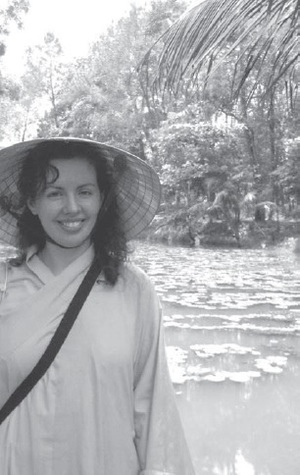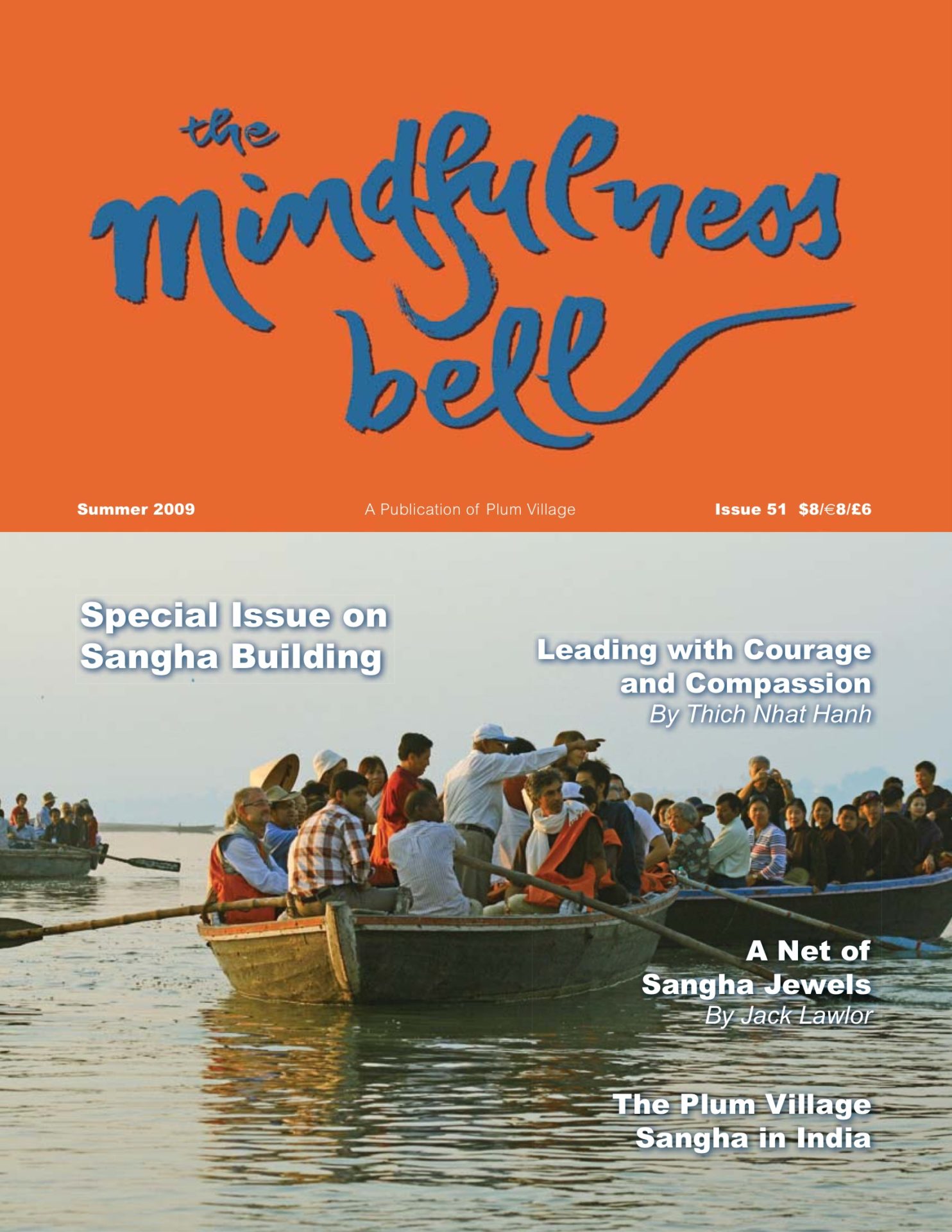By Bridgeen Rea

This talk was presented at the Vesak Conference in Hanoi in May 2008.
I first went to Plum Village for a week of the summer retreat in July 2005. Sitting with Thay and the Sangha around the lotus pond in Upper Hamlet—following my first-ever walking meditation—had a massive impact on me. Maybe it was the strong French sunshine or the beautiful pink lotuses,
By Bridgeen Rea

This talk was presented at the Vesak Conference in Hanoi in May 2008.
I first went to Plum Village for a week of the summer retreat in July 2005. Sitting with Thay and the Sangha around the lotus pond in Upper Hamlet—following my first-ever walking meditation—had a massive impact on me. Maybe it was the strong French sunshine or the beautiful pink lotuses, which I’d never seen before in my life, but I was deeply touched by the peace and the happiness all around me in Plum Village. I had a joyful, wonderful time and I felt lots of love. I decided to take the Five Mindfulness Trainings that week.
Back in Northern Ireland I went to meditation once a week in the Belfast Zen Centre, which follows the Soto Zen tradition. I feel like the Mindfulness Trainings worked on me, rather than me working on them. I was training to be a yoga teacher and tried to be as mindful as I could—when I remembered!
In August 2006 I went to the Neuroscience Retreat at Plum Village, where I met a psychologist from Dublin who told me I should go to Vietnam. I thought it was impossible, but I went! Many friends supported me to go and even my family were happy for me.
For the whole three weeks of segment two, I shared a room with Gladys from Hong Kong, who has now been ordained as Sister Si. I felt so happy to have met such a beautiful person. In Vietnam many of the lay friends encouraged me to start a Sangha in Belfast. In Belfast it’s not really possible to be Buddhist—if I say I practice Buddhism, people say ‘but are you a Catholic Buddhist or a Protestant Buddhist?’ and it’s only half a joke!
Growing Up During “the Troubles”
I was born in Belfast, Northern Ireland in 1974, five years into what is known as “the Troubles.” Growing up in a divided society rife with sectarianism, hatred, and fear was the norm, but I had a happy childhood and enjoyed school.
The Troubles did penetrate my life though. I was born on July 8, which is right in the middle of the ‘marching season’—the guaranteed time for trouble in Belfast. Belfast used to shut down and become a ghost town. I have memories of people protesting out on the streets when a hunger striker died around my eighth birthday and I didn’t get to go on a planned outing. When I was much older and wanted to have a party or an evening out in a local place, often my friends couldn’t come because of trouble in parts of the city.
As a teenager I had to be aware of going to places wearing my school uniform because it identified me as Catholic. I had to be careful about going out with Protestant boys. Also I was very aware that my name, Bridgeen, labels me as a Catholic, unlike my sister’s neutral name Jenny, which can be either Catholic or Protestant.
My family doesn’t understand the practice. They ask, “What is it you do, worship Buddha?” My parents and friends understand that Buddhism is a peaceful thing, but they worry that I’m too into it. They say, “Why don’t you just go on a ‘normal’ holiday?”
In April 2007 I told my friend Sinead about the idea of Sangha—she is a poet and very open to new ideas. She thought it was wonderful! She had just had a baby and thought that Sangha would be the perfect thing to help her balance her life. So with her encouragement I called a couple of friends who were interested or at least open-minded towards Buddhism and meditation. The Tall Trees Sangha started in my apartment. After a year five of us are still practicing once a week. It is very wonderful and brings all of us many blessings.
How to Be at Peace?
By coincidence when the Sangha started in May 2007, Northern Ireland installed its first power-sharing executive. Ten years after the historic Good Friday Agreement Northern Ireland finally has a locally elected government. This is something that my Granddad didn’t live to see and would never have believed could happen. Belfast has been transformed. In some ways the peace is still tenuous and people are now having to learn how to live in a new situation after forty years of conflict.
How to be at peace? My friend Sinead says: “I think there is a psychosis in the society here—there has to be, given our history—and it will take a long time for this to be resolved, even though we are witnessing miracles. They say for every year of conflict you need another year of reconciliation. And I think this affects people who live here on all sorts of levels.”
I work in the new government administration as a Press Officer — for a Minister who belongs to a party that my community once saw as the enemy. But in spite of the many positive events, sectarianism and fear are still rampant. The society is still very much divided in terms of where people live and the schools they go to. There are many social problems of deprivation, depression, and suicide.
My mindfulness practice and Sangha can’t do much on a large scale but on a micro scale five us are learning a lot from Thay and trying to nourish our good seeds. Every week we practice sitting meditation, walking meditation, listen to Thay speak on CD and we have a Dharma discussion. Two of us come from a Catholic background, one was brought up Protestant, one was brought up with no religion; there’s also a German guy whose religious background doesn’t really count in the Northern Ireland context!
Forgiving and Moving On
We don’t discuss politics or the state of society, rather our personal problems and challenges. I really believe in Thay’s saying “peace in oneself, peace in the world.” I aspire to follow the Five Mindfulness Trainings, though sometimes I don’t find it easy to live up to them.
Another Sangha member in his fifties with five children says gratefully that the Sangha nourishes the spiritual aspect inside him and that it makes a space in his week. He remembers being angry and depressed during the Troubles and shouting at the TV. I think every family experienced that.
He says: “Sangha is a space where people can express themselves without upsetting anyone. It is open-minded, far from my dogmatic Christian upbringing. I always feel uplifted after it. It also helps me to relax as I am often an anxious frightened person. As I lived through the Troubles the fear in the community was palpable and people were steeped in it, and they weren’t allowed to question it. The atmosphere was full of tension, hatred and anger — sectarianism and bigotry everywhere. You were constantly waiting on something bad to happen.”
When I am out socialising and people find out I practice meditation they ask me all sorts of questions. There is a lot ignorance, confusion, and misunderstanding about anything that comes from the East. There is fear that it’s some kind of cult or it’s against Christianity. Yet Belfast people are the salt of the earth; they are warm and friendly and funny! If you ever visit Belfast you will find people go out of their way to help you and make you feel welcome.
Because of our history we may have a dark sense of humour, but there is also awareness of the importance of forgiveness. People understand about changing and moving on for the sake of future generations.
Bridgeen Rea, Peaceful Gift of the Heart, hosts Tall Trees Sangha in her apartment in Whiteabbey Village, Belfast, Northern Ireland.

